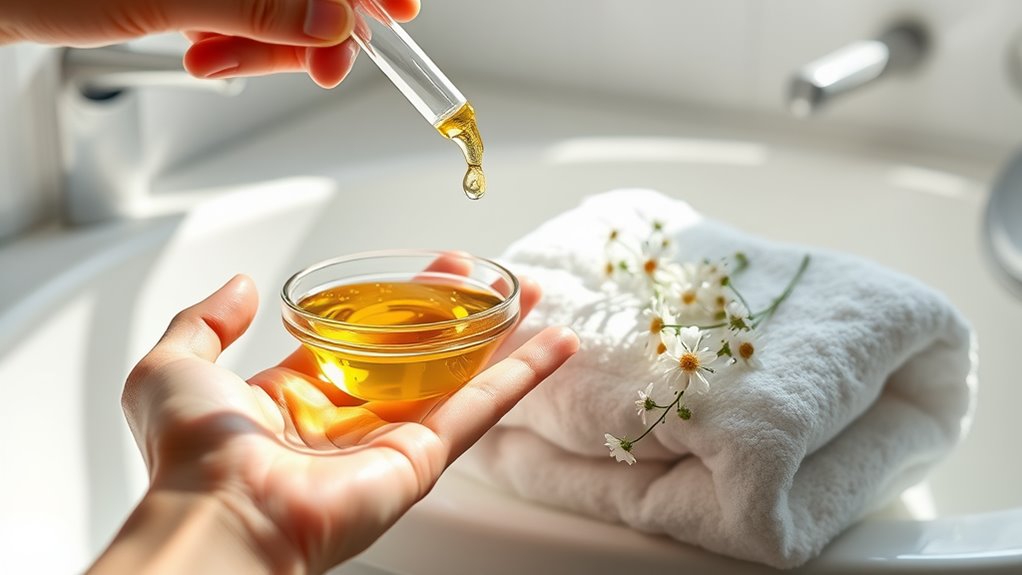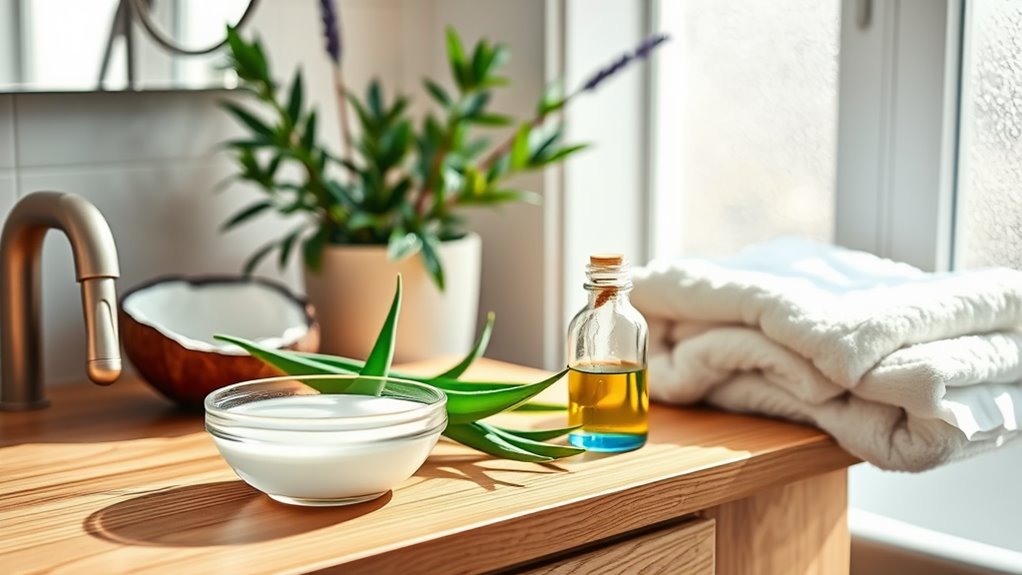Relieve That Itchy Ear Naturally With These Tips
Did you know that itchy ears can often be a sign of dryness or allergies rather than just wax buildup? It can be frustrating, but there are natural remedies that can help soothe your discomfort. From simple lifestyle changes to effective home treatments, you can find relief without relying on harsh chemicals. Let’s explore these tips to keep your ears healthy and itch-free.
Key Takeaways
- Apply a warm compress to soothe irritation and promote comfort in itchy ears.
- Use a mixture of equal parts apple cider vinegar and water for gentle relief.
- Incorporate omega-3 fatty acids into your diet to reduce inflammation and support skin health.
- Utilize essential oils like tea tree or lavender for their antifungal and anti-inflammatory properties.
- Stay hydrated and gently clean your outer ear to maintain moisture and prevent dryness.
Understanding the Causes of Itchy Ears
What causes that annoying itch in your ears? It could be due to dryness, allergies, or even an ear infection. Environmental factors like humidity and temperature changes might also play a role. Sometimes, excessive earwax buildup can lead to irritation and discomfort. If you’re experiencing earache, it’s essential to identify the underlying issue before seeking earache remedies for adults. You might consider over-the-counter treatments, but always consult a healthcare professional for personalized advice. Understanding the root cause can help you find effective solutions and relieve that pesky itch, ensuring your ears stay healthy and comfortable. Additionally, managing allergies effectively can significantly reduce the discomfort associated with itchy ears.
Natural Remedies to Soothe Itchiness
If you’re struggling with itchy ears, natural remedies can offer relief without relying on over-the-counter medications.
One effective method is to apply a warm compress to the ear, helping soothe irritation.
You can also try a mixture of equal parts apple cider vinegar and water; gently apply it to your outer ear with a cotton ball.
Additionally, keeping your ears dry is essential—after showering, use a towel to dry your ears thoroughly.
Finally, consider incorporating omega-3 fatty acids into your diet, as they can promote skin health and reduce inflammation, making your ears feel more comfortable. Warm compress therapy is a simple and effective option to alleviate discomfort from ear irritation.
Essential Oils for Ear Relief
Essential oils can be a powerful ally in relieving itchy ears.
You’ll want to know which oils work best and how to apply them effectively for maximum relief. Additionally, some essential oils like garlic oil contain antimicrobial compounds that can combat infections, providing further benefits for ear health.
Top Essential Oils
When dealing with itchy ears, certain essential oils can offer natural relief and soothing properties.
Tea tree oil is renowned for its antifungal and antibacterial effects, helping to combat irritation.
Lavender oil not only calms your senses but also reduces inflammation, promoting healing.
Chamomile oil provides a gentle, soothing effect, making it perfect for sensitive skin.
Eucalyptus oil is excellent for clearing congestion and promoting overall ear health.
Finally, peppermint oil can provide a cooling sensation and alleviate discomfort.
Incorporating these essential oils into your routine can help you manage itchy ears effectively and naturally.
Application Techniques
Applying essential oils for ear relief requires careful techniques to guarantee safety and effectiveness.
First, always dilute the essential oil with a carrier oil, like coconut or olive oil, to prevent irritation.
Use a dropper to place a few drops near your ear, avoiding direct contact.
You can gently massage the area around your ear to enhance absorption.
Alternatively, soak a cotton ball in the diluted oil and place it just inside your ear—never push it in too far.
Finally, make sure to test for allergies on a small skin area before full application, ensuring a safe experience.
Homeopathic Treatments for Ear Irritation
Homeopathic treatments offer a gentle approach to alleviating ear irritation, especially if you’re looking for natural alternatives.
Consider these three remedies:
- Calcarea carbonica: This remedy can help if you’ve got itchy ears due to wax buildup or sensitivity.
- Pulsatilla: Ideal for irritation accompanied by a thick discharge, it soothes discomfort effectively.
- Chamomilla: Great for those experiencing pain with irritation, it calms inflamed tissues and reduces swelling.
Additionally, it’s important to address common causes of ear pain to ensure effective treatment and prevent further discomfort.
Always consult with a homeopathic practitioner for personalized advice, ensuring you choose the remedy that best fits your symptoms and overall health.
Try these options and enjoy relief!
Lifestyle Changes to Prevent Itchy Ears
To keep your ears itch-free, make some simple lifestyle changes.
Staying hydrated, cleaning your ears properly, and steering clear of allergens can make a big difference. Additionally, practicing good hygiene to prevent ear infections can significantly enhance your ear health.
With a few adjustments, you can promote better ear health and comfort.
Hydration for Ear Health
How often do you think about hydration when it comes to your ear health?
Staying hydrated is vital for preventing itchy ears.
When your body’s dehydrated, your skin can dry out, including the delicate skin inside your ears.
Here are three tips to boost your ear health through hydration:
- Drink Plenty of Water: Aim for at least eight glasses daily to keep your body well-hydrated.
- Eat Hydrating Foods: Incorporate fruits like cucumbers and oranges, which are high in water content.
- Limit Caffeine and Alcohol: These can dehydrate you, so moderation is key for better ear health.
Ear Cleaning Techniques
Keeping your ears clean is essential for preventing itchiness and discomfort.
Start by gently wiping the outer ear with a soft cloth during your daily shower.
Avoid inserting anything into your ear canal, as this can push wax further in and cause irritation.
If you notice excessive earwax buildup, consider using over-the-counter drops designed to soften wax. Alternatively, a few drops of mineral oil can help as well.
Remember to dry your ears thoroughly after bathing to prevent moisture-related issues.
Regularly maintaining ear hygiene can greatly reduce itchiness and improve overall ear health.
Avoiding Allergens and Irritants
Although allergens and irritants are often overlooked, they can substantially contribute to itchy ears.
To keep your ears comfortable, consider these lifestyle changes:
- Identify Triggers: Pay attention to what causes your itchiness. Common allergens include pollen, dust mites, and pet dander.
- Limit Exposure: Once you know your triggers, take steps to avoid them. Use air purifiers and keep windows closed during high pollen seasons.
- Choose Gentle Products: Opt for hypoallergenic soaps and shampoos. Avoid harsh chemicals that can irritate sensitive skin.
Making these adjustments can help reduce irritation and keep your ears feeling great.
When to Seek Medical Attention
When should you consider seeking medical attention for an itchy ear? If your symptoms persist despite home remedies, it’s time to consult a professional. Additionally, watch for signs of infection, such as discharge, swelling, or severe pain. Here’s a quick guide to help you decide:
| Symptoms | Action Needed | Possible Conditions |
|---|---|---|
| Persistent itch | See a doctor | Allergic reaction |
| Discharge from ear | Immediate attention | Ear infection |
| Severe pain | Urgent care | Eardrum rupture |
| Swelling | Schedule an appointment | Otitis externa |
| Hearing loss | Medical evaluation | Blockage or infection |
Taking these steps can guarantee your ear health is properly managed. Additionally, if you experience increased pain when pulling on the outer ear, it may indicate an ear infection that requires medical attention.




